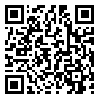Volume 18, Issue 2 (8-2019)
jhosp 2019, 18(2): 21-28 |
Back to browse issues page
Download citation:
BibTeX | RIS | EndNote | Medlars | ProCite | Reference Manager | RefWorks
Send citation to:



BibTeX | RIS | EndNote | Medlars | ProCite | Reference Manager | RefWorks
Send citation to:
Jafari Sirizi M, Esmaili A, Khodayari Zarnaq R, Arabloo J, Faraji O. Relation between Emotional Intelligence and Organizational Citizenship Behavior with Work Deviant Behaviors among Staff of Selected Hospitals in Tehran City. jhosp 2019; 18 (2) :21-28
URL: http://jhosp.tums.ac.ir/article-1-5951-en.html
URL: http://jhosp.tums.ac.ir/article-1-5951-en.html
Mehdi Jafari Sirizi1 
 , Anvar Esmaili2
, Anvar Esmaili2 
 , Rahim Khodayari Zarnaq3
, Rahim Khodayari Zarnaq3 
 , Jalal Arabloo4
, Jalal Arabloo4 
 , Obeidollah Faraji *
, Obeidollah Faraji * 
 5
5

 , Anvar Esmaili2
, Anvar Esmaili2 
 , Rahim Khodayari Zarnaq3
, Rahim Khodayari Zarnaq3 
 , Jalal Arabloo4
, Jalal Arabloo4 
 , Obeidollah Faraji *
, Obeidollah Faraji * 
 5
5
1- Associate Professor, Health Management and Economics Research Center, Department of Health Care Management, School of Health Management & Information Sciences, Iran University of Medical Sciences, Tehran, Iran
2- PhD in Health Policy, Iran Health Insurance Organization, Sanandaj, Iran
3- Assistant Professor, Health Care Management Research Center, Iranian Center of Excellence in Health Management ,Tabriz University of Medical Sciences, Tabriz, Iran
4- Assistant Professor, Health Management and Economics Research Center, Iran University of Medical Sciences , Tehran, Iran
5- Assistant Professor ,Social Determinants of Health Research Center, Research Institute for Health Development, Kurdistan University of Medical Sciences, Sanandaj, Iran, (* Corresponding author), Kurdistan University of Medical Sciences, Email: faraji.obeid@gmail.com ,faraji.obeid@gmail.com
2- PhD in Health Policy, Iran Health Insurance Organization, Sanandaj, Iran
3- Assistant Professor, Health Care Management Research Center, Iranian Center of Excellence in Health Management ,Tabriz University of Medical Sciences, Tabriz, Iran
4- Assistant Professor, Health Management and Economics Research Center, Iran University of Medical Sciences , Tehran, Iran
5- Assistant Professor ,Social Determinants of Health Research Center, Research Institute for Health Development, Kurdistan University of Medical Sciences, Sanandaj, Iran, (* Corresponding author), Kurdistan University of Medical Sciences, Email: faraji.obeid@gmail.com ,
Abstract: (3866 Views)
Background: One of the main concerns of managers is work deviant behaviors of employees. Workplace deviance is voluntary behavior that violates significant norms and in so doing threatens the well-being of an organization, its members or both. The study aimed to explore the relationship between emotional intelligence and organizational citizenship behavior with work deviant behaviors.
Materials and Methods: This study was a cross-sectional descriptive analytical one. This study was conducted on 290 employees (administrative workers and nurses) working in four selected hospitals in Tehran city including Shahid Motahati, Shahid Rajaii, Hazrat-E-Rasol, and Dr. Shariati. Sampling method was stratified random sampling method. Data collection instruments were three questionnaires including Schutte’s emotional intelligence, Padsakof organizational citizenship behavior, Bennett and Robinson’s work deviant behavior. Validity and reliability of the questionnaires has already been verified in studies before. Data analysis was performed using independent T-test, ANOVA, Tukey and parametric Pearson's Correlation Coefficient.
Results: Among demographic and organizational variables, There was a significant relationship between age and work deviant behavior (P=0.012). Reverse significant statistical relationship between emotional intelligence, organizational citizenship behavior and courtesy with work deviant behavior was observed (P=0.0001).
Conclusion: The study results revealed that personnel with higher emotional intelligence will have a more positive attitude and more allegiance and commitment toward the organization; therefore they will show more organizational citizenship behavior and less inclined to abuse in the workplace.
Materials and Methods: This study was a cross-sectional descriptive analytical one. This study was conducted on 290 employees (administrative workers and nurses) working in four selected hospitals in Tehran city including Shahid Motahati, Shahid Rajaii, Hazrat-E-Rasol, and Dr. Shariati. Sampling method was stratified random sampling method. Data collection instruments were three questionnaires including Schutte’s emotional intelligence, Padsakof organizational citizenship behavior, Bennett and Robinson’s work deviant behavior. Validity and reliability of the questionnaires has already been verified in studies before. Data analysis was performed using independent T-test, ANOVA, Tukey and parametric Pearson's Correlation Coefficient.
Results: Among demographic and organizational variables, There was a significant relationship between age and work deviant behavior (P=0.012). Reverse significant statistical relationship between emotional intelligence, organizational citizenship behavior and courtesy with work deviant behavior was observed (P=0.0001).
Conclusion: The study results revealed that personnel with higher emotional intelligence will have a more positive attitude and more allegiance and commitment toward the organization; therefore they will show more organizational citizenship behavior and less inclined to abuse in the workplace.
Type of Study: Original Article |
Subject:
مدیریت منابع انسانی در بیمارستان
Received: 2018/02/4 | Accepted: 2019/06/27 | Published: 2019/08/15
Received: 2018/02/4 | Accepted: 2019/06/27 | Published: 2019/08/15
Send email to the article author
| Rights and permissions | |
 |
This work is licensed under a Creative Commons Attribution-NonCommercial 4.0 International License. |



